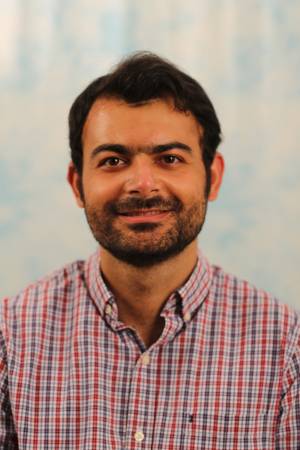Carnegie Mellon University
MSR Thesis Talk – Zhe Huang
Title: Distributed Reinforcement Learning for Autonomous Driving Abstract: Due to the complex and safety-critical nature of autonomous driving, recent works typically test their ideas on simulators designed for the very purpose of advancing self-driving research. Despite the convenience of modeling autonomous driving as a trajectory optimization problem, few of these methods resort to online reinforcement [...]
Carnegie Mellon University
MSR Thesis Talk- Xinjie Yao
Title: Ride Comfort-Aware Visual Navigation via Self-Supervised Learning Abstract: Under shared autonomy, wheelchair users expect vehicles to provide safe and comfortable rides while following users’ high-level navigation plans. To find such a path, vehicles negotiate with different terrains and assess their traversal difficulty. Most prior works model surroundings either through geometric representations or semantic classifications, [...]
MS Thesis Talk – Shun Iwase
Title: Fast 6D Object Pose Refinement via Deep Texture Rendering Abstract: We present RePOSE, a fast iterative refinement method for 6D object pose estimation. Prior methods perform refinement by feeding zoomed-in input and rendered RGB images into a CNN and directly regressing an update of a refined pose. Their runtime is slow due to the [...]
Carnegie Mellon University
Resource-Constrained Learning and Inference for Visual Perception
Abstract: We have witnessed rapid advancement across major computer vision benchmarks over the past years. However, the top solutions' hidden computation cost prevents them from being practically deployable. For example, training large models until convergence may be prohibitively expensive in practice, and autonomous driving or augmented reality may require a reaction time that rivals that [...]
Trajectory Optimization for Thermally-Actuated Soft Planar Robot Limbs
Abstract: Practical use of robotic manipulators made from soft materials requires generating and executing complex motions. We present the first approach for generating trajectories of a thermally-actuated soft robotic manipulator. Based on simplified approximations of the soft arm and its antagonistic shape-memory alloy actuator coils, we justify a dynamics model of a discretized rigid manipulator [...]
Carnegie Mellon University
Physical Interaction and Manipulation of the Environment using Aerial Robots
Abstract: The physical interaction of aerial robots with their environment has countless potential applications and is an emerging area with many open challenges. Fully-actuated multirotors have been introduced to tackle some of these challenges. They provide complete control over position and orientation and eliminate the need for attaching a multi-DoF manipulation arm to the robot. [...]
Time-of-Flight Radiance Fields for Dynamic Scene View Synthesis
Abstract: Neural networks can represent and accurately reconstruct radiance fields for static 3D scenes (e.g., NeRF). Several works extend these to dynamic scenes captured with monocular video, with promising performance. However, the monocular setting is known to be an under-constrained problem, and so methods rely on data-driven priors for reconstructing dynamic content. We replace these [...]
Snakes & Spiders, Robots & Geometry
Abstract: Locomotion and perception are a common thread between robotics and biology. Understanding these phenomena at a mechanical level involves nonlinear dynamics and the coordination of many degrees of freedom. In this talk, I will discuss geometric approaches to organizing this information in two problem domains: Undulatory locomotion of snakes and swimmers, and vibration propagation [...]
Combining vision-based tactile, proximity, and global sensing for robotic manipulation
Abstract: I will begin by describing our work on visual servoing a manipulator and localizing objects using a robot-mounted suite of vision and vision-based tactile sensors, our results, algorithms used, and lessons learned. We show that by collocating tactile, and global (e.g. an RGB(D) camera) sensors, our setup can perform better than using each type [...]
Carnegie Mellon University
Visual Representation and Recognition without Human Supervision
Abstract: The advent of deep learning based artificial perception models has revolutionized the field of computer vision. These methods take advantage of the ever growing computational capacity of machines and the abundance of human-annotated data to build supervised learners for a wide-range of visual tasks. However, the reliance on human-annotated is also a bottleneck for [...]
Design, Modeling and Control for a Tilt-rotor VTOL UAV in the Presence of Actuator Failure
Abstract: Providing both the vertical take-off and landing capabilities and the ability to fly long distances to aircraft opens the door to a wide range of new real-world aircraft applications while improving many existing applications. Tiltrotor vertical take-off and landing (VTOL) unmanned aerial vehicles (UAVs) are a better choice than fixed-wing and multirotor aircraft for [...]
Large Scale Dense 3D Reconstruction via Sparse Representations
Abstract: Scene reconstruction systems take in (3D) videos as input, and output 3D models with associated poses for inputs. With the demand of 3D content generation, the technique has been drastically evolving in recent years. For professionals equipped with depth sensors, efficient dense reconstruction systems have become available to efficiently recover scene geometry. For ordinary [...]
Carnegie Mellon University
Learning Multi-Modal Navigation in Unstructured Environments
Abstract: A robot that operates efficiently in a team with humans in an unstructured outdoor environment must translate commands into actions from a modality intuitive to its operator. The robot must be able to perceive the world as humans do so that the actions taken by the robot reflect the nuances of natural language and [...]
Lessons Learned from Creating Low-Cost Dexterous Soft Robot Hands
Abstract: Soft robot hands have shown promising results when it comes to dexterous grasping and manipulation. Compared to their rigid counterparts, soft hands can be manufactured for a fraction of the cost and offer robustness to uncertainty due to their inherent compliance. Unfortunately, the design and fabrication of soft robot hands is still a time-consuming [...]
Modern Trajectory Forecasting Methods Lack Social Awareness
Abstract: We present a thorough evaluation and analysis of state-of-the-art (SOTA) human trajectory forecasting methods with respect to metrics for safe and socially-aware prediction, e.g., collision rate, in addition to traditional displacement metrics, e.g., average displacement error. First, we introduce a system for trajectory classification which is used to evaluate the strengths and weaknesses of [...]








